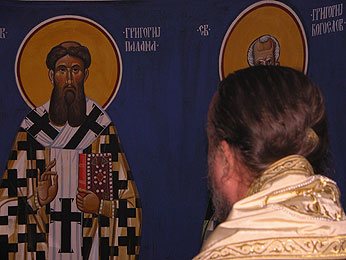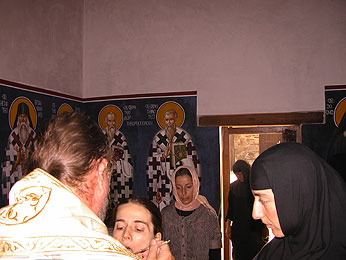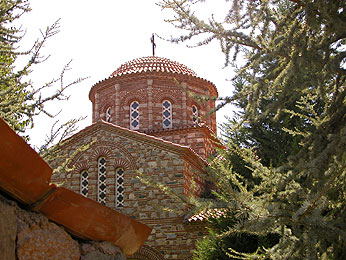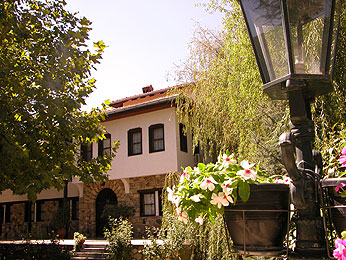Vodoča ( 06.09.2007 )
Today, on the feast day of the holy hieromartyr Eutyches, in the chapel of Saint Gregory Palamas and Elder Joseph the Cave-dweller in Vodoča, Metropolitan Nahum of Strumica celebrated Divine Liturgy.




Interpretation by the Most Reverend Nahum on today’s Gospel reading:
…From there He arose and went to the region of
The woman was a Gentile, a Syro-Phoenician by birth, and she kept asking Him to cast the demon out of her daughter.
But Jesus said to her, “Let the children be filled first, for it is not good to take the children’s bread and throw it to the little dogs.”
And she answered and said to Him, “Yes, Lord, yet even the little dogs under the table eat from the children’s crumbs.” Then He said to her, “For this saying go your way; the demon has gone out of your daughter.” (Mark 7:24-29)
Let us sum up: what, in fact, happened with the Syro-Phoenician woman at her meeting with Christ?
Firstly, she accepted Christ’s behaviour (a method of utter disregard) toward her i.e. His deed. Secondly, she accepted His word (utterly insulting) for her and by this His teaching as well. Thirdly, she accepted His will and
What meaning does all this have for our spiritual life?
The way the Syro-Phoenician woman behaves in respect to Christ shows the kind of attitude we should have toward our spiritual father i.e. the kind of obedience we should have to him who in our life is an icon of Christ, is seated at the place and is in the image of Christ; to him whom we freely and lovingly choose and to whose illumined mind voluntarily, of our own free will we subject our by pride distracted and darkened mind—all until, through growth in obedience, Christ Himself is portrayed and formed within us, all until we reach the level of “illumination of the mind.”
Thus, firstly we must accept the deed of our spiritual father regarding us. His behaviour toward us can be deliberately careless, neglectful, and even humiliating. Sometimes, especially when we need him, it may happen that we cannot see him, or even hear him on the telephone for a longer period. Another time we will notice that he is lenient to someone else, as opposed to his strict attitude toward us. Still, through ascetical humility and obedience, we should accept and receive all this as correct and salvific behaviour toward us, which purifies us from our pride and vanity, from our conceit and vainglory. We must not allow the demonic doubt, which always finds support in our hurt high self-esteem, to undermine our faith in God’s
Secondly, we must accept the word of our spiritual father about the things in the daily monastery life without any objections. Instead of any kind of knowledge of ours, which in a certain field of practical life can be even beyond common, often even greater than the knowledge of the spiritual father in that field, we should rather adopt the judgment of the spiritual father, in order to protect ourselves from falling into disobedience. We have not come to a monastery for agriculture, farming, construction work, or publishing and alike, but for purification of the heart and illumination of the mind, for the mind-and-heart prayer and for a perfect personal union with God, the Holy Trinity.
Thirdly, we must accept the will and discernment of our spiritual father as our own will and our opinion; we must act according to his final word. It is essential to check with our spiritual father all our particular thoughts, desires, and feelings, whether they are correct. Certainly, the examination implies also revealing our standpoints and viewpoints. These we must bring into accord with our father’s final word despite our identification with them and the spiritual pain we will suffer. Such obedience is particularly crucial in the period of the “purification of the heart” and must not be abandoned until the moment of receiving the gift of the mind-and-heart prayer. There is no other regular way. The only thing the spiritual child should worry about is when he notices that his spiritual father treats him with special attention: without raising the voice, without ignoring, without warning him etc.—then he should know he is off the road. Without such ascetical struggle of obedience, as we have explained above, we will never establish a personal relation with the spiritual father; with Christ either.
Obedience will necessarily bring us the grace of Christ and raise us from our “humiliation,” from the closure of our heart, from our slavery to the passions and to the demons linked together with them. Whereas, if we are not obedient, that is, if we do not accept the deed, word, discernment and will of him whom Christ has appointed to be our teacher and guide in the spiritual life, then we lose the personal union with God; for Christ says, “He who receives whomever I send receives Me; and he who receives Me receives Him who sent Me.” And vice versa, “He who denies you denies Me; and he who denies Me denies Him who sent Me.”
(as recorded by the monastery sisterhood)